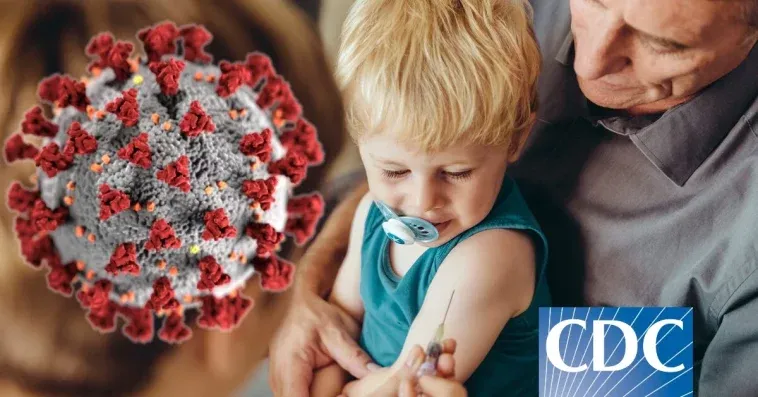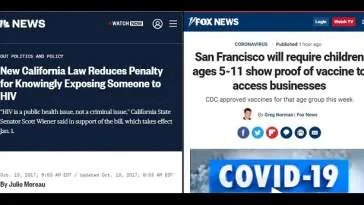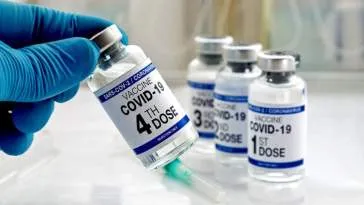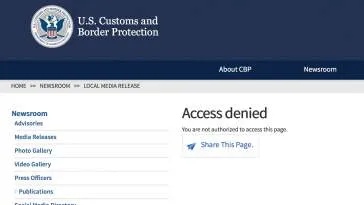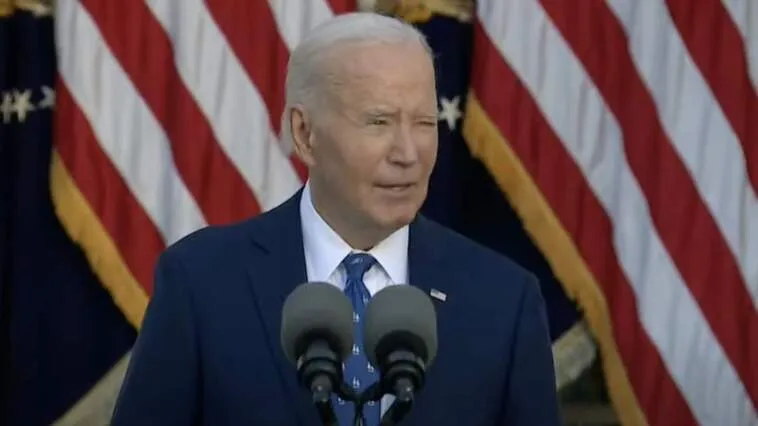(Gateway Pundit) For the first time, the ‘unsafe and ineffective’ COVID-19 vaccine was formally added to the routine immunization schedule for both children and adolescents by the Centers for Disease Control and Prevention (CDC) on Thursday.
It is common knowledge that COVID-19 poses no threat to young children, that mRNA vaccinations against the virus are not effective or safe and that some people have even died after receiving a COVID vaccine. But the CDC and its advisory council continue to push for childhood vaccinations despite all these facts.
Back in October 2022, the CDC’s Advisory Committee on Immunization Practices (ACIP), which provides advice and guidance to the Director of the CDC regarding the use of vaccines for the control of vaccine-preventable diseases, voted to recommend COVID-19 to be included in the 2023 childhood immunization schedule in 15 unanimous votes.
ACIP recommended the use of COVID-19 vaccines for everyone as young as 6 months and older. The COVID-19 vaccine and other vaccines may be administered on the same day.
Once CDC approves it, our Department of Health can exercise its rule-making authority to add it to the healthcare and school schedule at any time. And now it’s official.
The recommendation to include the experimental COVID vaccine was approved by the CDC together with doctors, nurses, and pharmacists on Thursday as they are bringing the COVID emergency declaration to an end.
“The 2023 child and adolescent immunization schedule, available on the CDC immunization schedule website, summarizes ACIP recommendations, including several changes from the 2022 immunization schedule,” CDC wrote on its website. “Health care providers are advised to use the tables, notes, and appendix together to determine recommended vaccinations for patient populations.”
“This immunization schedule is recommended by ACIP and approved by CDC, the American Academy of Pediatrics, the American Academy of Family Physicians, the American College of Obstetricians and Gynecologists, the American College of Nurse-Midwives, the American Academy of Physician Associates, and the National Association of Pediatric Nurse Practitioners,” CDC added.
The addition of the COVID vaccine gives a more official recommendation to healthcare providers and schools.
“This means COVID-19 vaccine is now presented as any other routinely recommended vaccine and is no longer presented in a special “call out” box as in previous years. This, in a sense, helps ‘normalize’ this vaccine and sends a powerful message to both healthcare providers and the general public that everyone ages 6 months and older should stay up to date with recommended COVID-19 vaccines (including a booster, when eligible), just as they would with any other routinely recommended vaccine,” Dr. Neil Murthy and Dr. A. Patricia Wodi said in a statement.
Routine vaccination of COVID vaccine per CDC:
- Primary series:
- Age 6 months–4 years: 2-dose series at 0, 4-8 weeks (Moderna) or 3-dose series at 0, 3-8, 11-16 weeks (Pfizer-BioNTech)
- Age 5–11 years: 2-dose series at 0, 4-8 weeks (Moderna) or 2-dose series at 0, 3-8 weeks (Pfizer-BioNTech)
- Age 12–18 years: 2-dose series at 0, 4-8 weeks (Moderna) or 2-dose series at 0, 3-8 weeks (Novavax, Pfizer-BioNTech)
- For booster dose recommendations, see www.cdc.gov/vaccines/covid-19/clinical-considerations/interim-considerations-us.html
Persons who are moderately or severely immunocompromised:
- Primary series
- Age 6 months–4 years: 3-dose series at 0, 4, 8 weeks (Moderna) or 3-dose series at 0, 3, 11 weeks (Pfizer-BioNTech)
- Age 5–11 years: 3-dose series at 0, 4, 8 weeks (Moderna) or 3-dose series at 0, 3, 7 weeks (Pfizer-BioNTech)
- Age 12–18 years: 3-dose series at 0, 4, 8 weeks (Moderna) or 2-dose series at 0, 3 weeks (Novavax) or 3-dose series at 0, 3, 7 weeks (Pfizer-BioNTech)
- Booster dose: see www.cdc.gov/vaccines/covid-19/clinical-considerations/interim-considerations-us.html
- Pre-exposure prophylaxis (monoclonal antibodies) may be considered to complement COVID-19 vaccination. See www.cdc.gov/vaccines/covid-19/clinical-considerations/interim-considerations-us.html#immunocompromised
The immunization schedules are updated annually in the late fall and are used as a guideline by states for school entry requirements and by physicians, and healthcare providers.
State or local authorities frequently consider the CDC’s schedule when establishing their school admission requirements.
The CDC claimed that adding the COVID vaccine to the list of immunization schedules does not mean it will be mandatory for school entry.
The agency stated that school-entry vaccination requirements are determined by state or local jurisdictions.
“Moving Covid-19 to the recommended immunization schedule does not impact what vaccines are required for school entrance, if any,” said Nirav Shah, M.D., director of the Maine Center for Disease Control and Prevention, during the 2022 ACIP meeting. “Local control matters. And we honor that the decision around school entrance for vaccines rests where it did before, which is with the state level, the county level, and at the municipal level if it exists at all.”
On Wednesday, CDC Director Rochelle Walensky testified at the joint hearing of the Health Subcommittee and the Oversight and Investigations Subcommittee regarding the federal response to Covid-19.
During the hearing, Walensky testified that the COVID vaccine was only added to the immunization schedule so that it would be covered by the “Vaccines for Children” program for uninsured children to have access to the vaccine.
“I think that we need to recognize [that] the reason that ACIP recommended and CDC put forward getting the COVID-19 vaccine on the pediatric schedule, it was the only way it could be covered in our Vaccines for Children program. It was the only way that our uninsured children would be able to have access to the vaccines. That was the reason to put it on the schedule. It can’t be eligible for the Vaccines for Children’s program to be available to the underinsured unless it is on that schedule. That was the reason to put it there. Thank you for allowing me to correct that,” said Walensky.
Walensky lied under oath. The Vaccines For Children (VFC) and Childhood Immunization Schedule are two distinct programs.
Watch the video:
Dr. Rochelle Walensky on Why an Experimental Vaccine was Added to the Childhood Schedule
“The reason ACIP recommended…getting the COVID-19 vaccine on the pediatric schedule, it was ONLY because it was the only way it could be covered in our ‘Vaccines for Children’ program” pic.twitter.com/k1CVf4cv09
— Chief Nerd (@TheChiefNerd) February 8, 2023
The Vaccines For Children (VFC) program is a federally funded program that provides vaccines at no cost to children who might not otherwise be vaccinated because of their inability to pay, according to the CDC.
The CDC buys vaccines at a discounted rate for distribution to registered VFC providers. Children who are eligible for VFC vaccines are entitled to receive those vaccines recommended by the Advisory Committee on Immunization Practices (ACIP).
Whereas, the Childhood Immunization Schedule, or childhood vaccine schedule, is the list of common vaccines the Centers for Disease Control and Prevention (CDC) recommends most children should receive, according to Cleveland Clinic.
The CDC’s Advisory Committee on Immunization Practices recommended to include the COVID-19 vaccine as part of the Vaccines for Children (VFC) Program last year, one day before it voted to include the COVID vaccine in the Childhood Immunization Schedule.
“The vote and the discussion around the addition of COVID-19 vaccines to the recommended immunization schedule is separate and distinct from yesterday’s vote in support of a resolution to add COVID-19 to the Vaccines for Children program schedule at the point the vaccines become commercialized,” said Nirav Shah, M.D., who just promoted in January as second in command – second in charge – under Director Rochelle Walensky.
“Yesterday’s vote, in effect, was a resolution about the coverage of the vaccine for un- and underinsured children. Not a discussion about what pediatricians ought to be doing in an office setting. This discussion today around adding the COVID-19 vaccine to the recommended childhood immunization schedule does not constitute a requirement that any child receive the vaccine. That decision remains where it did before. This is rather a codification of a preexisting recommendation,” she added.
So was she lying yesterday, or were the ACIP votes for the VFC program and the ACIP schedule based on lies that these votes were separate and distinct? https://t.co/gKDR41euLs
— Kelley K (@KelleyKga) February 9, 2023
And the prior comments from Dr. Daley said that “the reason things are added to the schedule is that we feel like the benefits strongly outweigh the risks.” Now @CDCDirector is saying they were only added to the schedule so that we could add them to the VFC program?!?
— Kelley K (@KelleyKga) February 9, 2023



